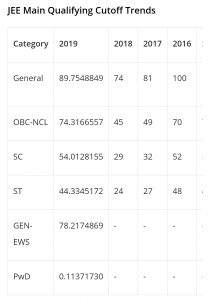Analysis of JEE Main 2020 Paper 1 (B.E./BTech.) January attempt

JEE Main 2020 was conducted by the National Testing Agency (NTA) for January session in computer-based test mode from January 6th to 9th. JEE Main 2020 Paper 2 was held on January 6 for B.Arch/B.Plan courses, while Paper-1 for BE/BTech courses was conducted from January 7 to 9. The next JEE main of this year will be held in April. The design of the paper, the choice of questions and the balance of all the topics showed that considerable thought went into the paper setting exercise. This is what was expected from the specialized body NTA. Compared to 2019, when NTA had very less time to roll out the JEE Main nationwide, this year it had more time and one can say that the time was well utilized.
As per the new JEE Main 2020 exam paper pattern set by the NTA, there were questions involving numerical answers and candidates had to fill in an answer that was correct to two decimal places. The numerical value questions had no negative marking. There were a total of 25 questions in physics, chemistry and mathematics section respectively, 20 being MCQs of single answer right type and balance 5 of numeric type.
Analysis of JEE Main 2020 Paper1 January attempt
A perusal of all the question sets shows that they were of moderate difficulty. A well prepared student should be able to perform reasonably well. Among the three subjects, Chemistry was found to be easy, Maths of moderate difficulty and Physics moderate to tough. These are relative to each other and should not be read in isolation. Let us now look at each of the subjects.
Mathematics
Mathematics paper overall was a stress reliever for students who prepare systematically.
- There were no time consuming questions with intense calculations.
- More than 50% of questions in every paper were similar to archives (That is JEE Main previous years’ questions). So understanding the underlying concepts behind all the previous year JEE Main questions in the right way will ensure decent marks.
- Understanding concepts in NCERT Book and doing the numericals in Coordinate Geometry, Statistics, Vectors, 3D, Probability, Permutations and Combination will ensure 100% marks from these chapters.
- Except for Differential Calculus and Theory of Equations rigorous and exhaustive study is not needed.
- There is no immense time pressure with the reduced number of questions. So focus should be on accuracy.
- Points to be kept in mind while preparing for JEE Main
- It is now a high score exam. So no chapter can be left for choice.
- Calculus and Algebra to be done with utmost care as they contribute close to more than 70% of the paper.
- Differential Calculus which is generally avoided by students for its variety of question models and numerous concepts should now be done carefully.
- Accuracy has to be given utmost care. It is better to practice with more numerical type questions during practice.
- All in all focus should be on scoring at least 80 marks in Mathematics for a decent rank in JEE Main
Chemistry
- Chemistry was of easy to moderate difficulty level in JEE Main 2020. Overall the section was well designed.
- In each paper, there were 6-7 very easy questions and about 5 tough questions.
- Some questions involved getting a few points by heart – 2-3 questions in organic and 1-2 questions in inorganic were of this type.
- What was refreshing this time was that there were some innovative questions in physical chemistry. They were not tough, but not of the beaten track. A well prepared student will answer these questions without sweat.
- Another striking feature was the balanced coverage to all the sections – organic, physical and inorganic and of all topics. Roughly 50% were from first year and 50% from second year, though some questions involved concepts from both years.
- Numerical questions which were introduced for the first time in JEE Main 2020 were relatively easy. Most of them from physical and inorganic sections. 1-2 questions in this type were purely memory based.
- In terms of time taken to answer the section, the first shift on 7th could be answered fastest, while the second shift on 9th was more time consuming.
- The implication for a student to prepare well is to focus on the NCERT Chemistry book very well. The student should be thorough with every topic and subtopic in the NCERT book. So text book reading is going to be an important element of preparation henceforth. It was important previously too, but more so now. Previous years’ JEE Main questions have to be solved and underlying concepts have to be understood.
Physics
- The physics section in JEE Main 2020 was of moderate difficulty. The questions were elegant and well designed. Rote learning wouldn’t have helped.
- Every paper had about 13-15 easy questions and about 3 tough questions.
- Second year topics had a slight edge over the first year topics.
- Most of the questions were direct not involving too many complications.
- Weightage to some topics such as in modern physics like semiconductors and communication systems was reduced.
- Numerical questions were simple without involving too many calculations. The answers were either integers or were correct to decimal places.
- The implication for students in terms of preparation is that they should be thorough with NCERT level concepts. The practice should involve more number of simpler questions.
JEE Main 2020 Cutoffs
Since the JEE Main 2020 papers were of moderate difficulty overall the cutoff scores will be higher than last year if one were to by only the January attempt. Of course, cut offs will be calculated after the April attempt taking into consideration the best of both attempts.
The JEE Main cutoffs for qualifying for JEE Advanced will be to ensure that the top 2.5 lakhs students move to the next level. The JEE Main cutoffs in previous years were as follows:

What Next?
The following will be the sequence of activities:
Release of JEE Main 2020 answer key
In the next couple of days student’s answer scripts will be sent to their respective emails and answer keys will be displayed officially.
JEE Main 2020 answer key challenge
Two days will be given for challenge of the declared answer key. Any students register the challenge by paying the required fees online. If the challenge is accepted the fees will be paid back.
JEE Main 2020 results
As soon as the challenges are reviewed JEE Main 2020 results in terms of percentiles scored will be released. Last year the results were declared by 19th January. This year also the results acne be expected by 20th January though the official date is end of January.
